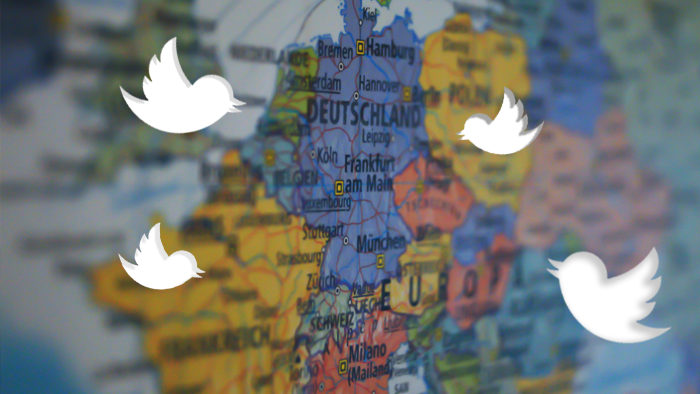You can’t have missed it, Elon Musk has bought Twitter – after much drama. Tweeters and the tech world as a whole won’t stop talking – with a certain amount of astonishment – about the chaos the American billionaire is generating: mass layoffs, verification charge, advertiser exodus, etc. Between dismay and fascination, the world watches what increasingly looks like a Netflix series whose possible ending is anyone’s guess. Much ink has already been spilled about blue bird’s twists and turns, and this isn’t what we want to talk about here. We’d rather focus elsewhere and discuss what this event can teach us, Europeans, about our own tech industry.

Great power. Responsibility, not so much…
Twitter isn’t “just” any other social media platform. It is a powerful mouthpiece for politics (Trump had made it his stronghold before he was banned, the death of Queen Elisabeth II was announced there first, etc.), business (a bad tweet can trigger major stock falls), and society. It is also from Twitter’s belly that the Me Too movement was born. Twitter also helped spread the hashtags “Bring Back Our Girls” or “Black Lives Matter”.
A fake verified tweet:

The direct consequence:

Twitter, therefore, is a lot more than a simple micro-blogging website. It’s a powerful political, social and societal echo chamber. Yet its buyout by Elon Musk amounts to putting all this power into the hands and at the service of a single individual. The individual in question is an American billionaire who describes himself as a “free speech absolutist” – except when you contradict or mock him – and makes no secret of his political views.

Whether you share Elon Musk’s opinions isn’t the issue. The issue is concentrating great power in the hands of a single person who openly makes his views known and wants to use the power of Twitter to serve them, under the guise of absolute freedom of speech.
Finally, the buyout of Twitter is an allegory of the colonisation of European tech by the US: foreign, cyclopean entities that spend billions of dollars to impose their vision of the world – concentrated power, brutal business practices, an ultra-liberal model.

What the buyout of Twitter teaches us, is that power concentration is deleterious. Rather than looking for unicorns, the European tech sector should think in terms of ecosystem to guarantee a diverse range of solutions.
Digital sovereignty is about having the power to say “no”
Sovereignty means being able to choose and act without pressure or constraint. In this case, the billionaire buys himself the world’s most influential social media and uses it to impose an americano-libertarian view of the world: all opinions are equally worthy and anything goes.

Free-speech absolutism also means no hate-speech regulation. That, is against European standards.
We are therefore facing a legal battle. On the one hand Twitter, subject to US law and under no public speech restrictions and on the other, nations where speech is regulated. Thierry Breton, EU Commissioner for the Internal Market, was quick to remind Musk that in Europe, Twitter would have to comply with local legislation.

Still, platforms were already particularly difficult to regulate before Musk’s arrival. The internet being such a vast and shifting space, how can we impose restrictions on entities worth billions and that can afford to threaten states openly?
What the buyout of Twitter teaches us, is that digital sovereignty concerns our capacity to act and decide in the digital arena, but its consequences extend far beyond the internet: they are political, legal and societal. Preserving our digital independence should be a priority.
Users want alternatives
Twitter’s Trending Topics (TT) are the social media’s most talked about topics. They are ever changing as they are created by users themselves. You can see that every time Elon Musk makes a major announcement about Twitter, the “Mastodon” trend goes through the roof:

• 25 April 2022: Twitter accepts Elon Musk’s 44-billion-dollar buyout offer.
• May 2022: The Tesla CEO announces that the operation would not go through until he is given proof that only 5% of accounts are fake, and unveils his vision for the social media (less moderation, more freedom of speech, reinstatement of banned accounts, etc.),
• Late October 2022: The deal is completed – this is when the redundancies and hick-ups mentioned above happen.
So, what does Mastodon have to do with this? Mastodon is a decentralised open-source alternative to Twitter (when they sign-up, users choose a server which is managed by a person or organisation. They can then interact on that server, where their data is stored).

What the buyout of Twitter teaches us, is that users are aware of Big Tech-related issues (American as well as Chinese), and they are aware of their own power: by leaving Twitter, they are saying “no” to the model that is being forced on them. Users see open-source solutions as sounder alternatives to proprietary Big Tech.
Open-source alternatives: yes, but no…
Following the migration phase, Mastodon regulars don’t believe that this trend will withstand the test of time, nor that it will displace Twitter one day. Why? Because besides technical issues with the model, Mastodon is “too difficult” to use. Here are a few examples of recent messages posted – ironically – on Twitter:



“Disaster”, “shitty”, too much “mental bandwidth”… this is what Mastodon castaways coming back to Twitter had to say about the open-source alternative.
This is an all too often common situation with open-source solutions, and one BlueMind has already talked about on multiple occasions: confusing the project with the product.
Don’t try and find Mastodon’s business model: there isn’t one. Launched by the German national Eugen Rochko in 2016, Mastodon operates as a non-profit – it is financed by donations. Over 650 programmers have contributed to its source code on a voluntary basis.
Mastodon is an open-source project, not a product. There is no governance, no roadmap and no UX team to define the user experience and make it user-friendly.
What the buyout of Twitter teaches us is that to be an alternative, it is imperative that you provide a pleasant, easy to understand user experience, or at least something close to it. Being European isn’t enough. Being open source isn’t enough. Users want to follow you and share your values, but they won’t compromise on experience quality. Just like you won’t trade in your car for a horse and cart that makes your journey longer and less comfortable, albeit more environmentally friendly, you won’t replace Twitter by an open-source project that doesn’t have user experience as a priority.
Don’t be wary of software publishers!
Software publishing means developing quality, lasting, user-centred software. It means being 100% focused on the solution: the product and all the tools that feed into it – migration tools, documentation (technical, functional or commercial) – as well as an ecosystem (integration and technological partners, for instance). We bring an overall, lasting vision and governance to ensure our solution’s coherence.
This level of quality is what users expect and what allows BlueMind to offer a sovereign, credible collaborative email alternative and, above all, one that is accepted by users and clients alike.
What the buyout of Twitter should help us realise, is that in Europe, we have successful competences, companies and ecosystems despite our states’ indifference and lack of support. In France, the government preaches sovereignty, alleging it is a strategic issue, while taking contradictory measures, for instance the “Cloud de confiance” (“trusted cloud”) label that encourages organisations to choose American solutions or to put together their own non-core solutions even though packaged offerings are available on the local market.
Software publishers are here. Solutions are available, including open-source ones, as the latest National Free Software Council survey shows. We must prioritise actions over words and opt for these solutions… before a billionaire snatches our “start-up nation”.





